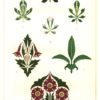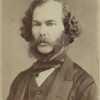
Irena Yamboliev, “Christopher Dresser, Physiological Ornamentist”
This article argues that, in 1862, when he published his most influential book The Art of Decorative Design, Christopher Dresser joined the multi-disciplinary enterprise of the physiological aesthetics in the name of ornamental form, positioning the theory of ornament as a crucial cutting edge of the empirical study of human aesthetic responses. I read The Art of Decorative Design in relation to contemporary psychological-aesthetics texts by Alexander Bain, Herbert Spencer, James Sully, Edmund Gurney, and Clementina Anstruther-Thomson and Vernon Lee to show that Dresser finds in ornamental form a site for a materialist physiological understanding of aesthetic response—and he does so well prior to the essays on aesthetics that were published in the journal Mind from the 1870s on. Like contemporary empirical aestheticists—and in distinction to other ornamentists of his time—Dresser emphasizes the mental “laws” that orchestrate our reactions to forms in nature and in ornament alike. Tracing in Dresser’s design handbook an approach to ornamental form that becomes fully “physiologized” in Bain’s, Sully’s, Gurney’s, and Lee’s writing makes more complete the critical picture of the so-called “lesser” (and often pejoratively feminized) decorative arts as a fertile ground for the theories and practices the empirical aestheticists were pursuing.

Scott C. Thompson, “On G. H. Lewes’s Problems of Life and Mind, 1874—79″
In Problems of Life and Mind (1874—79), George Henry Lewes posits his theory of “Scientific psychology,” which is founded on a synthesis between the objective study of the mind practiced in physiology and the subjective study of consciousness practiced in philosophy. Problems is an important text because it is one of the last quintessentially “Victorian” studies, a wide-ranging work produced before the full establishment of disciplinary boundaries. It combines a variety of discourses—including philosophy, physiology, psychology, evolutionary biology, and sociology—in order to establish a comprehensive methodology for the scientific study of consciousness. This entry positions Problems into its nineteenth-century psychological and philosophical tradition, as understood by Lewes; provides a summary of the overarching argument of Problems; and outlines the contributing sub-claims made in each of its discrete series.
